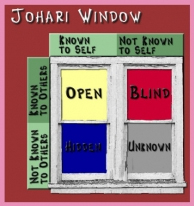
There are numbers of things that we know about ourselves. There are also some secrets about the real us that we would like to be kept unknown to everyone. There are some things about us that we discovered because of other people. And probably a large chunk of our true selves is still left unleashed even to our very own selves. And so, we ended up confused about the answer for this simple yet complicated question “Who am I?”. Hmmm… Who are we really?
In one of my subjects way back in highschool, I came across this Johari Window that somehow helped me found answer to this query. Developed by American psychologists Joseph Luft and Harry Ingham in the 1950’s, (calling it ‘Johari’ after combining their first names, Joe and Harry), this window works well for me in understanding my self and the others.
Johari window has four quadrants or regions, and these are the following: the open, blind, hidden and the unknown. The first quadrant tells about those that are known by the person about him/herself and are likewise known by others. The blind area on the other hand, represents the unknown, things that are alien to oneself but are known by others. The third one is the hidden area which suggests concealed truth about self that others do not know. Lastly, the unknown area reflects the unidentified truth about self, unknown by the person him/herself and is unknown by others.
The process of enlarging the open quadrant is called self-disclosure, a give and take process between us and other people we interact with. Typically, as we share something about ourselves (moving information from my hidden quadrant into the open) and if the other party is interested in getting to know us, they will reciprocate, by similarly disclosing information in their hidden quadrant. Thus, an interaction between two parties can be modeled dynamically as two active Johari windows. For example, one may respond to my disclosure that I like sports cars by letting me know what his/her favorite food is, or where a new restaurant is being built, kinds of information in someone’s hidden quadrant. But this is not always the case. Sometimes we have to be careful about revealing some truths about ourselves.
We have to be forewarned that most secrets get passed along to at least two more parties. Sometimes, people also misjudge how others respond to secrets. Sometimes we get negative feedback. For example, a student who revealed that she was raped may be seen in the future as a victim, or by men as damaged good. Now, if we will tell our secret to someone, we have to choose persons to confide with very carefully. We have to someone whose response will give us some insights into our problem. Unfortunately, such a person is often hard to find. So if we cannot find anyone appropriate, consider this: that keeping secrets is healthy and tasteful, because it is a way of managing our identity, and indicates that we are secured and we have self-control. But it takes energy, because we have to be on constant guard not to accidentally reveal something that is potentially damaging.
We really need to be extra careful in expanding this hidden and blind spots of ourselves. Balance is everything. Let’s not forget the parable of the blind men and the elephant. Many of us nowadays get very specialized, knowing only a small piece of knowledge very well, while being virtually ignorant of all others. And so now, the bottom line is, expand our window, know thy self and others but be extra wise and careful.
Check Also
Miss Universe Philippines – Batangas
Here are the official Candidates for Miss Universe Philippines – Batangas! Tisha Joie M. Mercado …
 WOWBatangas.com Your Source of Great News and Stories from the Province of Batangas, Philippines
WOWBatangas.com Your Source of Great News and Stories from the Province of Batangas, Philippines



